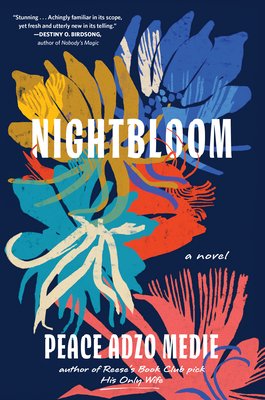Nightbloom by Peace Adzo Medie
Review of Nightbloom by Peace Adzo Medie
Nightblom by Peace Adzo Medie (2023). Published by Algonquin Books.
If you’re a frequent reader of my book reviews on this blog, you’re probably painfully aware that I have a tendency to wander my library for like an hour in search of books I’d never even heard of before.
I genuinely think one of the best ways to find a good book sometimes is to unplug, leave your phone at home, then just wander a bookstore of library (I prefer libraries, as they’re one of the only spaces that you’re not expected to spend money in) and pick out a book without reading any reviews or things online about it.
That’s how I found Nightbloom. I hadn’t heard of it beforehand, but it was in the new fiction section and had a cover that drew me in. I read the book jacket and decided to give it a chance.
I’ve been reading quite a few Ghanaian and African diaspora writers as of late, so this fit right in with the content I’ve been reading. And I read all of this in one sitting—that’s how deep I was absorbed into this story.
Let’s get into the review!
The story of two cousins from Ghana and their diverging paths.
Our protagonists in this novel are Akorfa and Selosi. They’re cousins, and Akorfa’s wealthier parents are well-known in their community, while Selosi is her cousin from the village.
The two are thick as thieves throughout their childhood, but as they grow older, we begin to see the divide between the two. The first half of the novel is told from Akorfa’s perspective, and her mother truly pushes her to become someone who gets into an Ivy League in the United States,
The people their family hangs out with all want their kids to go to Ivies, too, and they’re a privileged bunch. Their kids, like Akorfa, consume Western music and study hard at nice boarding schools to get their shot of going abroad, and their parents can afford to do so.
There’s a gap between her and her cousin, whose mother died and father cast her out, finding a new woman. Selosi watches the local movies, and, despite Akorfa’s confusion, doesn’t get along with her fellow classmates.
So the two start drifting, despite Akorfa’s father pulling strings for Selosi to go to the same nice school. We learn the truth of what happened here later on in Selosi’s perspective, but Akorfa just shrugs it all off as saying her cousin became distant and then stopped talking to her.
Eventually Selosi leaves them, and Akorfa goes abroad to the United States. She excels at her studies, despite not going to an Ivy League, but a life changing event is going to force her to reevaluate everything that led her to this point.
We switch after that to Selosi’s perspective, getting her side of things, which are much more complicated than Akorfa presented them, especially because there’s drama involving Akorfa’s mother.
I won’t go into too much detail, but it’s incredible how Selosi picks up the pieces of her life and becomes someone who’s happy with what she does, and eventually she becomes outspoken when she crosses paths with a corrupt government official who thinks he can do whatever he wants.
When she meets her old cousin again though, they’re going to have to confront their shared past together.
Overall Thoughts
In general, I really liked this novel and the themes it was presenting to us as the readers. My only qualm with it was its length and the structure—I think that by getting us deep into Akorfa’s story, then switching straight back into Selosi’s side of things was immensely jarring.
I’d already gotten into the rhythm of Akorfa’s life in the United States and everything it entailed, as well as her giving up on her dreams, but then we were ripped into the other side.
I understand why this decision was made, but I think weaving them together more, not separate, or two companion novels might’ve fit this a bit more. But don’t let this turn you off if you haven’t read it already—it’s a wonderful novel overall.
Follow me below on Instagram and Goodreads for more.


![Jeju-do (제주도) is one of those places that reminds you of how stunning the world is
[7.12.2024 부터 7.14.2024 까지]](https://images.squarespace-cdn.com/content/v1/5ea1f794501b7153b29e7cd7/1721033601522-554E76HR01JUHDWZBJ1I/image-asset.jpeg)









